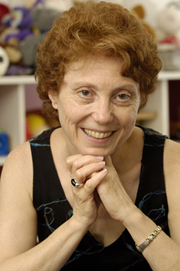 Today's interview features inspiring individual Nora S. Newcombe. Dr. Newcombe is Laura H. Carnell Professor of Psychology and James H. Glackin Distinguished Faculty Fellow at Temple University. Her Ph.D. was received in 1976 from Harvard University, where she worked with Jerome Kagan. Her research focuses on spatial cognition and development, as well as the development of autobiographical and episodic memory. A recent emphasis is on understanding the nature, development and malleability of spatial skills that facilitate learning of science, technology, engineering and mathematics (STEM). She is currently Principal Investigator of the NSF-funded Spatial Intelligence and Learning Center (SILC) and co-directs the Temple Infant and Child Laboratory (TICL) on Temple’s Ambler Campus and the Research in Spatial Cognition (RISC) Lab on Main Campus. Dr. Newcombe is the author of numerous chapters, articles, and books, including Making Space with Janellen Huttenlocher (published by the MIT Press, 2000). Her work has been recognized by numerous awards and publications. We're delighted to feature her wisdom in this interview.
Camp Spring Creek: We came across your essay published in American Educator titled “Picture This: Increasing Math and Science Learning by Improving Spatial Thinking” and agreed wholeheartedly with your observations. Thank you so much for providing teachers with concrete, age-appropriate ideas about incorporating spatial learning opportunities in their classrooms. We were struck by the idea that “learning styles” (ex. kinesthetic, auditory, visual) are a relative myth, and depend more on what a child is exposed to rather than any innate skills. Can you tell our readership, many of whom were trained under that philosophy of learning styles, a little more about this myth?
Today's interview features inspiring individual Nora S. Newcombe. Dr. Newcombe is Laura H. Carnell Professor of Psychology and James H. Glackin Distinguished Faculty Fellow at Temple University. Her Ph.D. was received in 1976 from Harvard University, where she worked with Jerome Kagan. Her research focuses on spatial cognition and development, as well as the development of autobiographical and episodic memory. A recent emphasis is on understanding the nature, development and malleability of spatial skills that facilitate learning of science, technology, engineering and mathematics (STEM). She is currently Principal Investigator of the NSF-funded Spatial Intelligence and Learning Center (SILC) and co-directs the Temple Infant and Child Laboratory (TICL) on Temple’s Ambler Campus and the Research in Spatial Cognition (RISC) Lab on Main Campus. Dr. Newcombe is the author of numerous chapters, articles, and books, including Making Space with Janellen Huttenlocher (published by the MIT Press, 2000). Her work has been recognized by numerous awards and publications. We're delighted to feature her wisdom in this interview.
Camp Spring Creek: We came across your essay published in American Educator titled “Picture This: Increasing Math and Science Learning by Improving Spatial Thinking” and agreed wholeheartedly with your observations. Thank you so much for providing teachers with concrete, age-appropriate ideas about incorporating spatial learning opportunities in their classrooms. We were struck by the idea that “learning styles” (ex. kinesthetic, auditory, visual) are a relative myth, and depend more on what a child is exposed to rather than any innate skills. Can you tell our readership, many of whom were trained under that philosophy of learning styles, a little more about this myth?
Dr. Nora S. Newcombe: Many people feel strongly that they like to learn some ways more than other ways. I think they may be right sometimes about what works for them, but not always. A particularly dangerous idea is that if you don’t like something or think you aren’t good at it, you should avoid it. Now that we know you can improve, it is sensible to say that we should all at least try to be well-rounded. It’s like eating. You may really and truly not like vinegar or artichokes, but you don’t really know until you’ve tried them. You might become an artichoke lover!
CSC: Is there one publication above all others that you might recommend for an enthusiastic education advocate or parent interested in learning differences? We’d like to know about something that isn’t wholly academic, but is still solid in its research and selection of content.
Dr. Newcombe: I would recommend another article in the American Educator. It’s by Dr. Daniel Willingham at the University of Virginia, whose Ask the Cognitive Scientist columns provide a wonderfully accurate and accessible account of what educators should know about cognitive science research. See http://www.aft.org/periodical/american-educator/summer-2005/ask-cognitive-scientist.
CSC: What advice would you give to a new elementary teacher who feels determined to “do it all,” yet likewise overwhelmed by the diverse needs presented by the children in any one given classroom?
Dr. Newcombe: I have never been a classroom teacher, but the teachers I know and admire all seem to me to be good at setting goals for themselves, starting with the basics of simple and solid and engaging classes and sensitive interaction with young children. In the longer run, they work on adding nuances and wrinkles. As with many things, it’s good to keep things simple at first, and proceed day by day.
CSC: We’re curious about your personal interest in education advocacy and spatial learning in particular. What draws you to focus on these things and how have you seen children in your own family struggle or succeed in today’s educational environments?
Dr. Newcombe: My interests are based on my love of science and math. I like to look at maps and graphs and diagrams, and I love visual art too. I just want to spread my passion because I think other people may enjoy (and benefit from) this way of thinking too.
